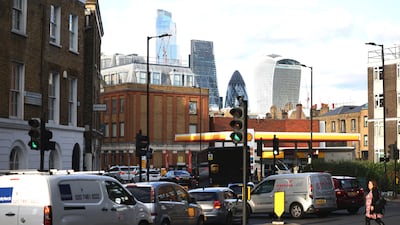Britain’s Prime Minister Boris Johnson has put army tanker drivers on standby to ease the chaos at petrol stations across the country.
Following mounting pressure from industry figures to alleviate the crisis, the UK government confirmed it had alerted the armed forces and said military drivers would get special training.
After cars queued at stations on Monday for the fifth day running, ministers made another announcement to say certain driving licences for heavy goods vehicles would be extended.
The UK is suffering from a shortage of 100,000 qualified HGV drivers, according to the Road Haulage Association.
Many European drivers who had worked in Britain returned to their homelands during the pandemic and failed to come back to the UK.
The coronavirus crisis also caused major disruption to driving tests, which delayed the process for many would-be HGV drivers to obtain their licence.
In recent days the government has come under intense pressure to solve the problem. On Saturday it announced a three-month visa scheme for 5,000 HGV drivers from overseas.
An extension to ADR licences, which allow drivers to maximise their available capacity instead of being taken out of circulation for refresher training, was also announced.
Defence Secretary Ben Wallace said: “The men and women of our armed forces stand ready to alleviate the transport pressures where they are felt most.
“That is why I have authorised their increased preparedness so they are ready to respond if needed.”
The army drivers will deliver fuel to where it is needed most and provide reassurance that supplies remain strong, the government said.
The decision comes after Environment Secretary George Eustice said on Monday that the government was not planning to bring in army drivers.
UK drivers are also being hit by rising prices at the pumps.
The average price of a litre of petrol jumped from 135.87p ($1.85) on Friday to 136.59p on Sunday, according to the RAC, an automotive services company.
Prices at the pumps have not been that high since September 2013.
On Tuesday, Dr David Wrigley, deputy chairman of the British Medical Association, called for health and social care workers to be allowed to skip the queues at petrol stations.
Dr Wrigley urged the government to use whatever means necessary to alleviate the crisis, including the option of bringing in soldiers to drive fuel tankers.
“We can’t dither and wait and just see and hope that this settles down. We have to act today,” he told Sky News.
“We can’t continue like this day to day. We’re told it’s going to be over in a day or two but we can’t risk that.
“We’re talking today about health and social care workers wanting to get on and do their job.
“We can’t be waiting in queues for petrol or diesel when we have patients to see.
“We do need a system in place today. There’s no information at all about how we get around this problem, how we deal with it if our fuel is running very low and we have patients to see.
“So we need urgent action today from the government.”
The government’s announcement came after Business Secretary Kwasi Kwarteng issued a request for military aid to the civil authorities.
He said ministers expect demand for fuel to return to normal levels this week, but added “it’s right that we take this sensible, precautionary step”.
“If required, the deployment of military personnel will provide the supply chain with additional capacity as a temporary measure to help ease pressures caused by spikes in localised demand for fuel."
Transport Secretary Grant Shapps announced the extension to ADR licences, which allow drivers to transport goods such as fuel.
The measure will apply to licences expiring between Monday and December 31, and extend their validity until January 31 next year.
“We are starting to see panic buying moderate, with more grades of fuel now available at more petrol stations,” Mr Shapps said.
“Even though the current network of tanker drivers is capable of delivering all the fuel we need, we have taken the additional step of asking the army to help plug the gap, while new HGV drivers come on stream thanks to all the other measures we’ve already taken.”
But shadow defence secretary John Healey, of the opposition Labour Party, said the move was an “admission of failure from a government that continues to rely on the army to bail it out”.











